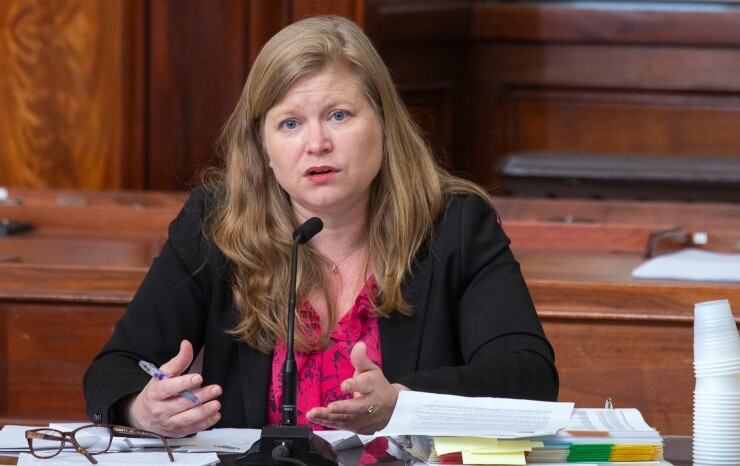A fix for the embattled New York City Housing Authority could involve Infill development and air rights, both involving private investment.
NYCHA, which serves 400,000 residents or about 5% of the city's population, is under a federal monitor, amid a precarious Washington funding landscape; has a variety of operational crises and a credibility problem from years of mismanagement; and is staring at a $32 billion capital-needs backlog.

Necessary fixes include lead and mold exposure, broken elevators, heating outages and leaky roofs.
"Business as usual will not improve the living conditions," said Andrew Rein, president of the watchdog Citizens Budget Commission.
The key to realizing $3 billion for NYCHA is including sufficient market-rate units in any new development, according to Rein.
"The greater the portion of market-rate units, the more a developer is willing to pay NYCHA for development rights," he said. "Requiring a greater share of affordable housing makes the land less valuable to developers and generates less revenue for NYCHA."
Still, private development is politically sensitive in New York. Case in point is community pushback over a possible plan to demolish two NYCHA buildings at the Fulton Houses in Chelsea, with private developers involved in the rebuilding.
"It's important to first get something built, then tear down an existing structure," said Howard Cure, director of municipal bond research for Evercore Wealth Management.
NYCHA, meanwhile, is moving "full-steam ahead" on a $13 billion initiative to repair 62,000 units through public-private partnerships under the federal Section 8 Rental Assistance Demonstration program, interim chief executive Kathryn Garcia said Tuesday.
"We are on track to do another 5.000 units this year. We've done big bundles for Brooklyn and Manhattan," Garcia told the City Council committees on finance and public housing at a joint City Hall hearing.
In addition, NYCHA has put out a request for qualifications to add more small developers and local social service organizations to the pipeline.
According to Rein, a rental building with 20% its units set aside for low-income tenants — a so-called 80-20 project — would raise nearly three times as much revenue as a similar-sized building with 50% affordable units.

"To date NYCHA has taken only modest steps in pursing infill development, in large part due to resistance by local elected officials. These delays have cost NYCHA millions in revenue and allowed the developments that would have benefited from repairs to deteriorate further."
Disputes over private development have slowed a planned 50-50 project at Holmes Towers, on East 92nd Street and First Avenue along the Upper East Side.
NYCHA is pursuing similar deals at Cooper Park, Wyckoff Gardens and LaGuardia. Meanwhile, the authority shelved another proposal for Harborview Towers in Manhattan's Hell's Kitchen with up to three-quarters market-rate units.
"These developments alone need $469 million in funding over the next five years," Rein said. "If the sites remain undeveloped, they will generate no revenue and NYCHA’s buildings will suffer."
According to Cure, the city's own problems combined with an unreliable federal landscape warrant private involvement. "Just to be fair to the 400,000 residents, you have to start looking at these private engagements," he said.
Cure added that private management of daily NYCHA operations could also be on the table. "I'm not sure about the labor situation," he said.
The NYCHA 2.0 plan Mayor Bill de Blasio announced last year called for transferring a portion of NYCHA's estimated 80 million square feet of unused air rights to adjacent privately owned sites. The mayor estimates the move could generate $1 billion in capital repairs.
As part of a lawsuit settlement with the federal government, U.S. Housing and Urban Development named Bart Schwartz as NYCHA's monitor. Schwartz, a former assistant U.S. attorney in the Southern District of New York, is chairman of the investigations firm Guidepost Solutions.





